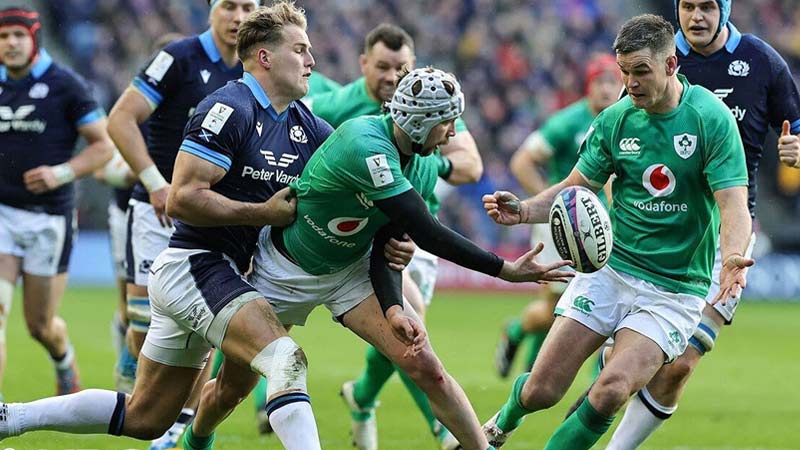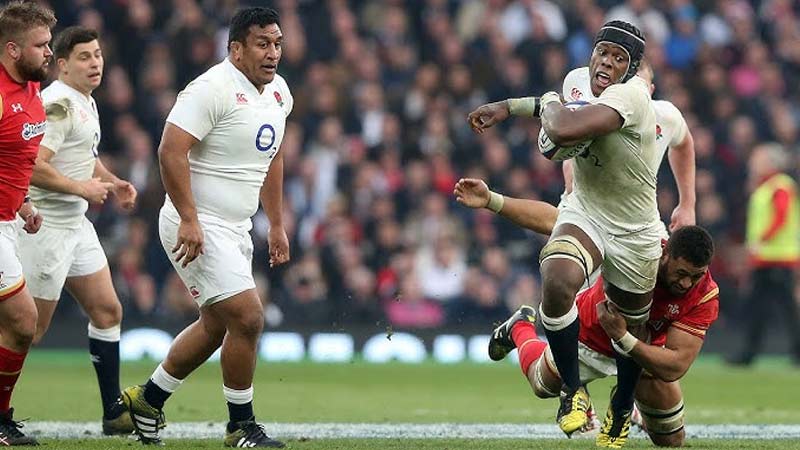In the realm of rugby, there are championships and accolades that hold a special place in the hearts of players and fans alike. One such honor steeped in history and tradition is the coveted Triple Crown.
While it may evoke images of equine racing, in the rugby world, the Triple Crown signifies a remarkable achievement earned on the hallowed fields of the British Isles.
So, what does the Triple Crown mean in rugby? The Triple Crown is a symbol of supremacy in a specific rugby context, and understanding its significance requires delving into the rich tapestry of the sport’s heritage.
In this exploration, we embark on a journey to decode what the Triple Crown truly means in rugby, tracing its origins, the teams that compete for it, and the fervor it ignites among nations bound by their passion for the oval ball. Join us as we uncover the essence of this venerable rugby tradition.
What Does the Triple Crown Mean in Rugby?
The origins of the Triple Crown date back to the late 19th century when rugby was gaining popularity in the British Isles. The term “Triple Crown” was first associated with rugby in 1883 when the concept of a Home Nations Championship was formalized.
The Home Nations Championship comprised the four rugby-playing nations of England, Ireland, Scotland, and Wales.
The idea was simple: if one nation could defeat the other three during the championship, they would achieve the Triple Crown. This prestigious title recognized the team’s dominance over its rivals within the British Isles.
The Nations Competing for the Triple Crown

The Triple Crown is contested among the four British and Irish rugby nations:
England
The birthplace of rugby, England boasts a rich rugby heritage and has been a formidable force in the sport. The English team has clinched the Triple Crown on numerous occasions and remains a perennial contender.
Ireland
Ireland has a passionate rugby tradition, with a fervent fan base. Irish teams have consistently challenged for the Triple Crown, and their victories are celebrated with great enthusiasm.
Scotland
Scotland, known for its vibrant rugby culture, has contributed immensely to the Triple Crown’s history. The Scottish team’s tenacity and skill have made them a formidable competitor.
Wales
Rugby holds a special place in the heart of Wales, and the Welsh team has a storied history in the competition. The passion of Welsh fans and the team’s commitment to the Triple Crown have made for memorable moments.
The Triple Crown Battles
The quest for the Triple Crown unfolds within the framework of the Six Nations Championship, which succeeded the Home Nations Championship in 2000 with the inclusion of Italy and France.
To achieve the Triple Crown, a team must secure victories against the other three home nations during the Six Nations tournament.
These matches, steeped in tradition and rivalry, are highly anticipated by players and fans alike. They are not only battles for supremacy but also contests that carry immense national pride and bragging rights.
The atmosphere in the stadiums and the intensity on the field during these clashes are unparalleled.
Significance and Cultural Impact

The Triple Crown holds a unique place in the hearts of British and Irish rugby enthusiasts. It represents not only sporting excellence but also a celebration of shared heritage and competition among close neighbors.
Achieving the Triple Crown is a source of immense pride for the winning nation and its supporters.
For fans, the Triple Crown matches are circled on the rugby calendar, and attending these games is a cherished tradition. The rivalry and camaraderie among fans from different nations make these contests an unforgettable experience.
Memorable Triple Crown Moments
Over the years, the Triple Crown has produced countless memorable moments and iconic victories. From dramatic last-minute tries to nail-biting encounters, these matches have etched themselves into rugby folklore.
One such historic moment occurred in 1971 when the British and Irish Lions toured New Zealand. The Lions, representing England, Ireland, Scotland, and Wales, secured a Test series victory against the All Blacks and claimed the Triple Crown of international rugby.
This achievement resonated far beyond the rugby world, becoming a symbol of unity among the home nations.
The Triple Crown in the Modern Era
In the modern era of rugby, the Triple Crown remains a prestigious accolade, even as the sport has evolved. The competition has intensified, and the skill level of players has reached new heights.
Yet, the allure of the Triple Crown endures, and it continues to captivate fans and players alike.
The introduction of bonus points in the Six Nations Championship has added a new layer of complexity to the Triple Crown race. Teams not only strive to win matches but also aim to secure try-scoring bonus points, further emphasizing the importance of attacking play.
How to Win the Triple Crown in Rugby?

In this section, we will unravel the path to winning the Triple Crown and explore the key factors that contribute to this remarkable achievement.
Mastering the Six Nations Championship
The Triple Crown is contested within the framework of the Six Nations Championship, a prestigious annual tournament that features England, Ireland, Scotland, Wales, France, and Italy.
To win the Triple Crown, a team must secure victories against the other three home nations during the Six Nations competition.
Defeating Home Nation Rivals
To embark on the journey towards the Triple Crown, a team must first focus on its home nation rivals: England, Ireland, and Scotland (for Wales) or Wales, Scotland, and Ireland (for England).
These matches are the linchpin of Triple Crown success and are often referred to as “Triple Crown fixtures.”
Victories in these highly anticipated contests are crucial. Teams must prepare meticulously, both physically and mentally, to overcome fierce competition and hostile crowds. It is in these matches that the foundation for Triple Crown success is laid.
Achieving Consistency
Consistency is key when vying for the Triple Crown. Winning one or two of the Triple Crown fixtures is not enough; a team must secure victories against all three home nation rivals.
This requires maintaining a high level of performance throughout the entire Six Nations Championship.
Consistency involves not only winning matches but also accumulating points through try-scoring and securing bonus points for attacking play.
The introduction of bonus points in the Six Nations has added a strategic dimension to the competition, emphasizing the importance of attacking prowess.
Tactical Mastery
Successful Triple Crown campaigns often hinge on tactical mastery. Coaches and players must develop a game plan that capitalizes on their team’s strengths while exploiting the weaknesses of their opponents.
Tactical considerations include set-piece strategies, defensive organization, kicking game management, and exploiting opportunities in open play. The ability to adapt to varying conditions, such as weather and field conditions, is also paramount.
Building a Strong Squad
Winning the Triple Crown requires a squad of skilled and fit players. Teams must have depth in key positions, including the front row, halfbacks, and the backline. Injuries and suspensions are a part of the game, so having capable replacements is essential.
Building team chemistry and cohesion is equally important. The best squads are not just collections of talented individuals but cohesive units that understand their roles and communicate effectively on and off the field.
Mental Toughness
Mental toughness is a defining characteristic of Triple Crown-winning teams. The pressure and expectations that come with pursuing this prestigious title can be immense. Players must remain focused, composed, and resilient in the face of adversity.
Mental preparation includes visualizing success, managing pressure, and maintaining a positive mindset. Experienced leaders within the team play a crucial role in instilling mental toughness among the players.
Support from Fans
The support of passionate fans is a driving force behind Triple Crown success. Home and away supporters create an electrifying atmosphere that motivates the team and disrupts the opposition.
The energy and fervor of fans can make a significant difference in closely contested matches.
A Bit of Luck
While skill and preparation play a significant role, a bit of luck can also be a factor in winning the Triple Crown. Rugby is an unpredictable sport, and sometimes a bounce of the ball or a fortunate decision by the referee can swing a match in favor of one team.
Celebrating the Achievement
Winning the Triple Crown is a momentous achievement and is often celebrated with great fanfare. It is a source of immense pride for the team, the coaching staff, and the nation. Celebrations often include trophy presentations, parades, and recognition of the players’ contributions to rugby history.
FAQs
What is the significance of the Triple Crown in rugby?
The Triple Crown in rugby is a prestigious accolade that symbolizes supremacy within the British and Irish rugby landscape. It is awarded to a team that secures victories against the other three home nations—England, Ireland, and Scotland (for Wales) or Wales.
Has any team won the Triple Crown multiple times in a single Six Nations Championship?
While it’s not common, there have been instances where a team has won the Triple Crown multiple times in a single Six Nations Championship. This occurs when a team secures victories against the other three home nations in a single tournament.
What happens if two or more teams finish with the same number of Triple Crown victories in a Six Nations Championship?
In the event that two or more teams finish with the same number of Triple Crown victories in a Six Nations Championship, tiebreakers such as points difference and try difference are used to determine the winner.
Is the Triple Crown awarded in the Women’s Six Nations Championship as well?
Yes, the Triple Crown is also contested in the Women’s Six Nations Championship. In the same manner as the men’s competition, it is awarded to the women’s team that secures victories against the other three home nations during the championship.
What is the historical significance of the Triple Crown in rugby?
The Triple Crown in rugby holds historical significance as it has been won by legendary teams and players who have made lasting contributions to the sport.
Achieving the Triple Crown is a source of immense pride for the winning nation and is often celebrated with trophy presentations.
Conclusion
The Triple Crown in rugby is more than just a collection of victories; it’s a testament to the spirit of competition and camaraderie that defines the sport. It represents a storied history, a battle for supremacy, and a celebration of national pride among the British and Irish nations.
As we’ve explored the significance of the Triple Crown, we’ve discovered that it is not just a symbol of on-field success but also a reflection of the deep-rooted rugby traditions that have thrived for over a century.
In a world where rugby continually evolves, and new competitions emerge, the Triple Crown remains a cherished jewel in the crown of rugby traditions. It serves as a reminder of the enduring values of teamwork, sportsmanship, and the love for the game, transcending borders and generations.
The Triple Crown is more than silverware; it is the embodiment of rugby’s history, culture, and the enduring bonds of friendship forged on the battlefield of the rugby pitch.







